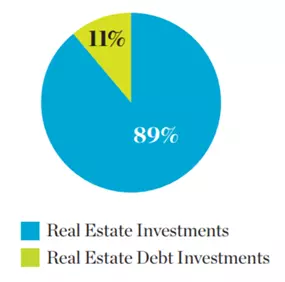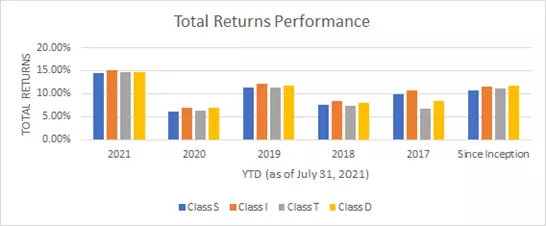Blackstone Real Estate Income Trust (BREIT) is a SEC-registered, non-traded, hybrid, perpetual-life REIT that offers investors a unique opportunity to diversify their portfolios and invest in real estate properties across various sectors. In this article, we will take an in-depth look into BREIT and explore its key features, performance metrics, and investment portfolio.
Key Takeaways
- BREIT invests in real estate properties across 8 sectors, including residential, industrial, net lease, self-storage, hotel/hospitality, retail, and office.
- As of July 2021, BREIT owns a total of 1,508 real estate properties located across the U.S.
- The occupancy rates for most sectors are above 90%, except for the hotels/hospitality sector which was heavily impacted by the COVID-19 pandemic.
- BREIT has a diverse real estate debt portfolio, with a fair value of $5.7 billion as of Q2 2021.
- BREIT offers 4 types of common shares, each with its own fee structure and suitability requirements.
- The NAV prices of all class shares experienced a drop in the first quarter of 2020 due to the pandemic but recovered by the end of the year and have since shown significant growth in the first half of 2021.
- BREIT issues consistent monthly distributions to its shareholders, with each common stock class receiving a gross distribution of $0.6354 per share in FY 2020.
- Total returns for all class share classes since inception range between 10% - 11%, outperforming the MSCI U.S. REIT Index net return in 2020.
 Image Source: BREIT Fact Card
Image Source: BREIT Fact Card
Company Background
Blackstone Real Estate Income Trust, Inc. (BREIT) is a Maryland corporation founded in 2015. It started operating as a non-traded REIT in 2017 and is sponsored by the Real Estate Group of The Blackstone Group, Inc., a reputable company with decades of real estate experience. BREIT's corporate headquarters is located in New York.
BREIT focuses on investing in stabilized and diverse real estate portfolios to provide income to its investors. It has investments in various sectors such as residential, industrial, office, storage, and hotel/hospitality. The company also plans to expand its presence in the European real estate market and other countries.
Blackstone REIT Type
Public, Non-Traded, Perpetual-Life REIT
BREIT is a SEC-registered REIT since 2017, and although it reports its financial statements and updates to the public through SEC filings, its shares are not traded on public exchanges like NYSE or NASDAQ. To invest in BREIT, investors must meet certain suitability requirements and have a minimum investment amount ranging from $2,500 to $1M, depending on the class of shares.
BREIT offers four types of common shares, each with its own fee structure. It's important to note that non-traded REITs typically have higher management fees compared to traded REITs.
 Image Source: BREIT Fact Card
Image Source: BREIT Fact Card
BREIT's common stocks are priced at their fair value in terms of net asset value (NAV) instead of daily market fluctuations. This approach helps avoid market volatility that may not directly relate to real estate. NAV REITs, like BREIT, are valued daily or monthly with a limited liquidity period.
Hybrid REIT
BREIT is a hybrid REIT as it invests in both equity and mortgage real estate. Its equity investments cover a diverse range of real estate properties, with a focus on residential and industrial sectors. The company earns income by leasing out rental spaces to clients.
In addition to equity investments, BREIT also has real estate debt investments through securities and loans backed by the U.S. market. These investments include commercial mortgage-backed securities (CMBS), residential mortgage-backed securities (RMBS), corporate bonds, mezzanine loans, and other real estate-related loans.
BREIT has consistently paid monthly distributions since its inception, providing attractive income opportunities for investors.
Diverse Mix of Sectors
BREIT's real estate property portfolio is diverse, covering various sectors and offering a wide range of investment opportunities. The company's recent investments include residential, industrial, net lease, self-storage, retail, and office properties. Additionally, BREIT may explore investments in healthcare and data center sectors.
 Image Source: BREIT Prospectus (as of June 30, 2021)
Image Source: BREIT Prospectus (as of June 30, 2021)
What Blackstone REIT Fund Invests In
As of July 2021, BREIT owns a total of 1,508 real estate properties across the U.S., with a small percentage of investments in Europe. These investments include direct property investments, equity in public and private real estate-related companies, and unconsolidated investments. BREIT also has a joint venture with MGM Growth Properties LLC, owning 49.9% interest.
BREIT's real estate investments operate in various sectors, including residential, industrial, net lease, hotel/hospitality, self-storage, retail, and office.
The company's real estate debt portfolio consists of investments in commercial and residential mortgage-backed securities, real estate-related corporate credit, mezzanine loans, mortgage loans, and equity interests in companies that invest in real estate debt.
BREIT Portfolio
Market Geography
BREIT primarily focuses on the U.S. market, with a strong presence in the West and Southern states. However, the company also has investments in Europe, albeit to a smaller extent.
 Image Source: BREIT Fact Card (as of July 2021)
Image Source: BREIT Fact Card (as of July 2021)
Investment Portfolio Category
BREIT's real estate investment portfolio can be categorized into two main categories: real estate investments and real estate debt investments.
As of FY 2020, BREIT holds 1,370 real estate properties and 228 positions in real estate debt investments.
 Image Source: BREIT Fact Card (as of July 2021)
Image Source: BREIT Fact Card (as of July 2021)
The majority of BREIT's income comes from rental revenues across various asset classes, with residential and industrial sectors contributing significantly. The real estate debt investments also provide added liquidity for cash management and share repurchase plans.
Real Estate Properties
BREIT's real estate properties have high occupancy rates, with most sectors exceeding 90% occupancy, except for the hotels/hospitality sector, which was heavily affected by the COVID-19 pandemic.
Here is a brief overview of BREIT's real estate investments:
- Residential: Includes rental housing such as multifamily and single-family homes, student housing, senior living, and manufactured housing.
- Industrial: Includes warehouse spaces for the commerce industry.
- Net Lease: Refers to assets like The Bellagio Las Vegas and unconsolidated interest income from MGM Grand and Mandalay Bay.
- Hotel/Hospitality: Refers to leisure properties that generate revenue primarily from daily operations.
- Self-Storage: Includes storage spaces for personal and business use.
- Retail: Includes malls and shopping centers.
- Office: Includes office spaces for various business operations.
For a more comprehensive overview of BREIT's real estate investments, refer to the table below:
| Sector | Units/Keys/Sq. Ft | Occupancy Rate | % of Total Revenue | Clients | No. of Properties |
|---|---|---|---|---|---|
| Residential | 93,174 units | 94% | 38% | EdR Student Housing Portfolio, Southeast MH portfolio, Acorn Multifamily Portfolio, etc. | 298 |
| Industrial | 154M sq. ft | 96% | 32% | Jupiter 12 Industrial Portfolio, Canyon Industrial Portfolio, Meridian Industrial Properties, etc. | 938 |
| Net Lease | 24.8M sq ft | N/A | 13% | Bellagio (NV), MGM Grand (NV), & Mandalay Bay (NV) | 3 |
| Hotel/Hospitality | 9,672 keys | 49% | 10% | Raven Select Service Portfolio, Hyatt Regency Atlanta (GA), JW Marriott San Antonio Hill Resort (TX), etc. | 58 |
| Self-Storage | 10.9M sq. ft | 94% | 4% | Simply Self Storage, East Coast Storage Portfolio, Cactus Storage Portfolio, etc. | 150 |
| Retail | 2M sq. ft | 96% | 2% | SoCal Grocery Portfolio, Canarsie Plaza (NY), Bakers Center (PA), etc. | 13 |
| Office | 946,000 sq. ft | 99% | 1% | EmeryTech Office (CA) & Coleman Highline Office | 3 |
Source: BREIT Q2 2021 Report
BREIT's residential properties, especially multifamily homes, generate significant rental revenue. The industrial sector is also a strong performer for the company. BREIT has been actively acquiring real estate properties, with 15 investments made in 2021 alone.
Real Estate Debt
BREIT also invests in non-distressed real estate debt, including commercial mortgage-backed securities (CMBS), residential mortgage-backed securities (RMBS), corporate bonds, mezzanine loans, mortgage loans, and equity interests in companies that invest in real estate debt.
As of Q2 2021, BREIT's real estate debt investments have a fair value of $5.7 billion, with a weighted average coupon of 5% and a weighted average maturity date of July 5, 2025. These debt investments provide leverage and enhance the potential for investment returns.
BREIT Performance
Historical NAV Per Share
BREIT's common stocks are priced at their fair value in terms of net asset value (NAV). Unlike traditional publicly-traded REITs, NAV REITs like BREIT have less volatile NAV prices. The NAV prices of all class shares experienced a drop in the first quarter of 2020 due to the COVID-19 pandemic but have since recovered and shown significant growth in the first half of 2021.

Source: BREIT Fact Card
Key Performance Metrics Through The Years
To assess BREIT's operating performance, it's important to analyze key financial parameters such as total equity, total revenue, net income (loss), and funds from operations (FFO).
| Fiscal Year | Total Equity | Total Revenue | Net Loss (attributable to BREIT stockholders) | FFO |
|---|---|---|---|---|
| June 2021 | $23B | $1.5B | ($146M) | $483M |
| FY 2020 | $16.1B | $2.5B | ($853M) | $406M |
| FY 2019 | $10.6B | $1.7B | ($401M) | $358M |
| FY 2018 | $3.9B | $723M | ($281M) | $110M |
| FY 2017 | $1.5B | $158M | ($86.2M) | $33M |
BREIT's total equity continues to increase as its investment portfolio expands. The company's total revenue has also shown consistent growth. Although the company has incurred net losses, it's important to note that these losses are primarily attributable to the real estate debt portfolio. FFO, a common metric used in the REIT industry, has been positive since the company's inception.
Dividends Distribution History
BREIT has consistently issued monthly distributions to its stockholders since its inception in 2017. The total net distribution per share varies among the different class shares, with Class I shares having the highest distribution in terms of net value in FY 2020.

Total Returns History
Total returns for all class share classes since inception range between 10% - 11%, demonstrating strong performance. BREIT has outperformed the MSCI U.S. REIT Index net return in 2020, which saw a negative return of -7.6%.

In conclusion, BREIT offers investors a unique opportunity to diversify their portfolios and invest in a wide range of real estate properties across various sectors. With its strong performance, consistent monthly distributions, and attractive total returns, BREIT has established itself as a leading player in the NAV REIT market.
(Note: The images used in this article are sourced from the original article, and the alt text of the images has been provided.)

















